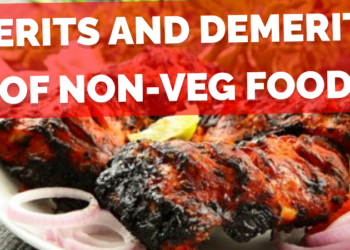When it comes to food choices, deciding between vegetarian and non-vegetarian options is a decision many individuals grapple with. The choice to consume non-vegetarian or “non-veg” food is a personal one, often influenced by cultural, ethical, and health considerations.
In this article, we will explore the merits and demerits of non-veg food to help you make an informed decision based on your own values and needs.
Merits of Non-Veg Food (Advantages of non-veg foods)
- High-Quality Protein: Non-veg foods, particularly meat, are excellent sources of high-quality protein. They contain all essential amino acids required by the body for growth, repair, and maintaining muscle mass.
- Nutrient Density: Non-veg foods are rich in essential nutrients such as iron, zinc, B vitamins (like B12), and omega-3 fatty acids. These nutrients are crucial for overall health and well-being.
- Complete Proteins: Some non-veg foods like eggs and dairy products provide complete proteins, ensuring that you get all the essential amino acids your body needs.
- Taste and Versatility: Non-veg food is often appreciated for its taste and versatility in cooking. It can be prepared in various ways to suit different palates.
- Heme Iron: Meat contains heme iron, which is more easily absorbed by the body compared to non-heme iron found in plant-based foods. This makes it an important dietary source for those at risk of iron deficiency.
- Satiety: Non-veg meals tend to be more satisfying and can help control hunger and prevent overeating.
- Cultural Significance: In many cultures, non-veg foods have deep-rooted traditions and are an integral part of various ceremonies and celebrations.
- Environmental Efficiency: Surprisingly, non-veg foods can be more environmentally efficient in terms of land and water usage compared to certain plant-based crops. For example, it takes less land to produce the same amount of calories from beef as it does from certain grains.
- Tissue Repair and Growth: Non-veg food supports tissue repair and growth, making it important for children, athletes, and individuals recovering from illness or injury.
- Complete Nutrient Profile: Non-veg foods offer a comprehensive array of essential nutrients, reducing the need for dietary supplementation in some cases.
Try Vegetarian Products: Click Here
Demerits of Non-Veg Food (Disadvantages of non-veg foods)
- Ethical Concerns: The most significant demerit of non-veg food is the ethical dilemma surrounding animal rights and welfare. The process of raising and slaughtering animals for food can be contentious.
- Health Risks: High consumption of certain non-veg foods, especially processed and red meat, has been linked to an increased risk of chronic health conditions such as heart disease and cancer.
- Environmental Impact: The livestock industry is a major contributor to greenhouse gas emissions, deforestation, and water pollution. It can have a significant negative impact on the environment.
- Cost: Non-veg food is often more expensive than plant-based alternatives, especially if you opt for high-quality, sustainably sourced products.
- Food Safety Concerns: Handling and cooking non-veg food improperly can lead to foodborne illnesses, making food safety a significant concern.
- Cultural and Dietary Restrictions: Some individuals or religious groups have dietary restrictions that limit or prohibit the consumption of non-veg food, making it less accessible.
- Cholesterol and Saturated Fat: Certain non-veg foods, like red meat and fatty cuts, are high in cholesterol and saturated fats, which can negatively impact heart health if consumed excessively.
- Overfishing: The demand for seafood has led to overfishing in many regions, threatening the balance of marine ecosystems.
- Allergies: Some people are allergic to specific non-veg foods, like shellfish or eggs, which can cause severe reactions.
- Misuse of Antibiotics: In some farming practices, antibiotics are used extensively in raising animals, contributing to the growing concern of antibiotic resistance.
More Read Article:










